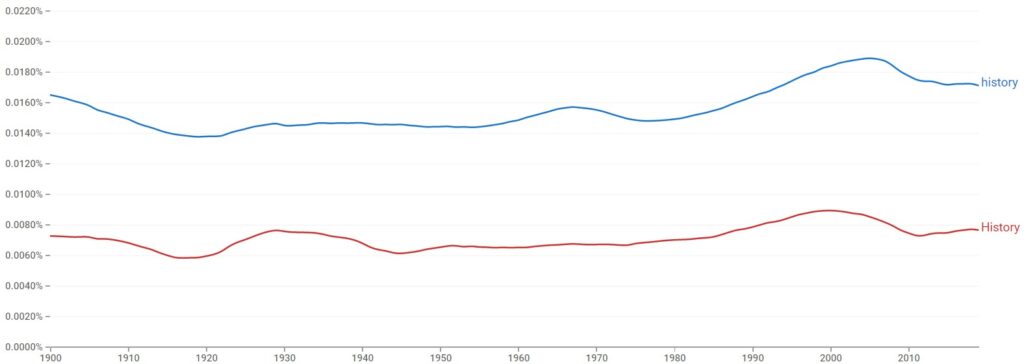When should we capitalize the word “History”?
The truth is “History” is a word we use in different ways, so the question is when should it be treated with the formality of having “H” capitalized? We want to know what’s the rule and what mistakes we should try to avoid.
Is “History” Capitalized?
As a field of study, when mentioned in official or formal contexts, “History” should be capitalized. For example, in a diploma or as the official name of a department or office, “History” should begin with a capital “S”. However, as a common noun, “History” doesn’t have to be capitalized.

Take a look at the examples below:
- Kurt loves his history class in school.
- Kurt is pursuing a Bachelor’s Degree in American History.
The examples present different scenarios, for us to consider. The first sentence mentions that Kurt likes learning “History”. He likes it in general. Just because it’s interesting and fun, is one of the subjects in school he likes to learn about.
Because in this sentence “History” is a general area of interest, with no official context, it doesn’t need to be capitalized. In other words, “History” as a subject needs no capitalization.
The second sentence is different. “History” is mentioned as the degree Kurt is pursuing. It’s very official and important. Consequently, we need to capitalize the whole title, including “History” which appears with a capital “H”.
It’s important to keep those differences in mind, to be able to decide with certainty when the word “History” should or shouldn’t be capitalized.
Also, keep in mind that for AP Style writing the general rule is the same. However, we recommend that you check your sources to make sure that you are doing it correctly and not missing any exceptions or details that are important.
Is “History” a Proper Noun?
“History” can be a proper noun, but not always. When we mention “History” in official settings, it’s a proper noun and should be capitalized: someone’s diploma, the name of a department, the official name of a class, etc. If you’re just talking about “History” in general, it’s a common noun.
When to Capitalize “History”
Every time you use the word “History” as a proper noun it should be capitalized. If it’s the name of something formal and official. For example, as an official major, as the name of a class, as the name of an office, etc. If it’s official, “History” should be capitalized.
Take a look at some helpful examples below:
- The Ph.D. program in Art History is famous worldwide.
- Johnson works in the Chinese History Department.
- Anya teaches World History 101 in our community college.
- The university has a renowned Department of American History.
- I’m proud to be the head of the History Department.
- Introduction to History is a mandatory class in my program.
When to Not Capitalize “History”
Whenever “Science” is mentioned as a common noun or, in other words, as a general area of interest, it shouldn’t be capitalized. If the context isn’t formal or official and is just another regular conversation about “History” no capitalization is needed. That’s the rule we should follow.
Take a look at some examples:
- My daughter is thinking about getting a degree in history.
- Julian used to be a history teacher before he started his own business.
- Do you enjoy learning about art history?
- Where can I find the history teacher?
- The university offers degrees in areas like history, art, science, and languages.
- I’m very interested in history as a subject and buy books about it all the time.
Which Is Used the Most?
What do people use more, the capitalized version of the word “History” or the lower case version? We’re curious to find out and, to do that, we’ll take a look at the graph from Google Ngram Viewer below.

“History” in all lower case in the prevalent form of the word. People talk more about “History” as a general topic than they do as a field of study. It means that “History” is mentioned more often with no official or formal pretenses.
Although both forms of the word “History” seem to follow the same trend, increasing and decreasing in use at the same time, there hasn’t been a memento in time when capitalized “History” was used more than the lower case version.
Either way, never forget that both versions are correct. You just have to know when to capitalize “History” and when to leave it all lower case and apply that knowledge appropriately.
Final Thoughts
“History” should be capitalized when mentioned in an official or formal setting. It should be kept without capitalization when mentioned as a subject, or a general area of interest. Official settings for the word “History” include university departments and offices, diplomas and degrees, and the names of classes.

Martin holds a Master’s degree in Finance and International Business. He has six years of experience in professional communication with clients, executives, and colleagues. Furthermore, he has teaching experience from Aarhus University. Martin has been featured as an expert in communication and teaching on Forbes and Shopify. Read more about Martin here.

